While touring this beautiful old mission my thoughts turned to the fact that
the founders of it were in fact following Jesus command to go into all the
world and share the gospel. They in fact traveled on foot just as Jesus did.
Each of the missions are placed a day's walk from each other.
 Nancy reads the Founding Document. It was signed by Padre Junipero
Serra on November 1, 1776; it lists details of supplies and their origins.
Serra was a Franciscan missionary born in Majorca, a large island off the coast
of Spain. He worked among the Indians in Mexico until the age of 55, when
he became leader of the Spanish missionaries in California. He founded
nine of the 21 California missions before his death in 1784.
Nancy reads the Founding Document. It was signed by Padre Junipero
Serra on November 1, 1776; it lists details of supplies and their origins.
Serra was a Franciscan missionary born in Majorca, a large island off the coast
of Spain. He worked among the Indians in Mexico until the age of 55, when
he became leader of the Spanish missionaries in California. He founded
nine of the 21 California missions before his death in 1784.
The Soldier's Barracks  was built in 1781; it housed the four to six soldiers stationed at the
Mission. They were known as "leatherjackets" because of the
protective vests they wore.
was built in 1781; it housed the four to six soldiers stationed at the
Mission. They were known as "leatherjackets" because of the
protective vests they wore.
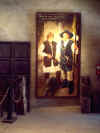

 This hut made of tule leaves is called kiitka, traditional housing
for Juaneno Indians before the Spanish arrived.
This hut made of tule leaves is called kiitka, traditional housing
for Juaneno Indians before the Spanish arrived.
The Spanish padres who founded the
missions were the first to bring a wide variety of plants from throughout the
world and plant them in California soil.

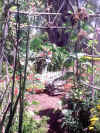
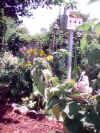
Mission gardens began as agricultural plots where a variety of
grains and vegetables were grown. Then followed orchards of apples, pears,
nuts and olives. Old World pomegranates were a favorite of the Spanish
padres, believed to "purge the system of envy and hate."
 Wine production began in 1779, as grapevines from Baja California were brought
in.
Wine production began in 1779, as grapevines from Baja California were brought
in.
Today the Capistrano Mission's gardens are elegant and
colorful, 

having a wide variety of attractive plants, shrubs and trees
from around the world.
(Now here is a a very prickly shrub  covered with thorns--very long thorns.)
covered with thorns--very long thorns.)
The main courtyard features rain-forest jacaranda trees from
Brazil, statuesque African cape chestnut trees 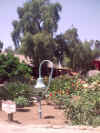 ,
swaying native palms
,
swaying native palms  ,
a European strawberry tree, a orange cestrum from Guatemala, and a pineapple
guava from Western Paraguay.
,
a European strawberry tree, a orange cestrum from Guatemala, and a pineapple
guava from Western Paraguay.
 Today the central courtyard is a beautiful and elegant garden, but it was once a
place of colorful events and activities, such as rodeos. The townspeople
sat on the roofs to watch young men demonstrate their talents as horsemen.
Today the central courtyard is a beautiful and elegant garden, but it was once a
place of colorful events and activities, such as rodeos. The townspeople
sat on the roofs to watch young men demonstrate their talents as horsemen.
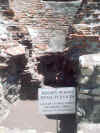 The metal furnaces, California's first, were used to make iron into tools,
hardware and other equipment.
The metal furnaces, California's first, were used to make iron into tools,
hardware and other equipment.
Mission Indians prepared meals in the outdoor kitchen. 
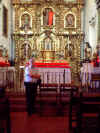 The Serra Chapel was built in 1776-78; this is the oldest building in
California. The beautiful baroque altar is from Barcelona, Spain, and is
made of cherrywood with a gold leaf overlay.
The Serra Chapel was built in 1776-78; this is the oldest building in
California. The beautiful baroque altar is from Barcelona, Spain, and is
made of cherrywood with a gold leaf overlay.
 The bells originally hung in the tower of the Great Stone Church until the
earthquake of 1812. The large bells date back to 1796 and the small bells
to 1804. Bells were important to early Mission life, taking the place of
clocks. They called the community to meals, religious services, work and
recreation.
The bells originally hung in the tower of the Great Stone Church until the
earthquake of 1812. The large bells date back to 1796 and the small bells
to 1804. Bells were important to early Mission life, taking the place of
clocks. They called the community to meals, religious services, work and
recreation.
These dioramas provide a glimpse of the Juaneno Indians and
their lives at the Mission.




The Great Commission........
Then....................................................Now
 ............................
............................

